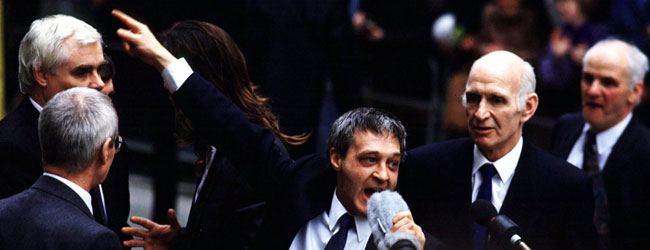4 March 2011
Release of the Birmingham Six

Paddy Hill points to the Old Bailey as the symbol of British justice as the Birmingham Six are freed
IN the late 1980s, the British police and judicial system came under intense national and international scrutiny as the framing of Irish people for offences they did not commit was exposed in the media and in the courts. The best-known of these frame-up victims were the Birmingham Six.
Irishmen Billy Power, Paddy Hill, John Walker, Gerry Hunter, Hugh Callaghan and Richard McIlkenny were arrested in the wake of bomb explosions in two Birmingham pubs in November 1974 in which 19 people were killed. The men had nothing to do with the bombings which had resulted in civilian deaths as a result of inadequate warnings phoned by the IRA unit responsible.
In 1975, the Birmingham Six were convicted on the basis of forced confessions extracted after beatings and with the aid of bogus forensic evidence. This evidence claimed to show that there were traces of an explosive substance on their hands but it was later discovered that the substance found was used to coat playing cards of the same type with which the men had played on a railway journey before their arrest.
The six Irishmen always maintained their innocence and a campaign for their release developed in the 1980s. On 28th January 1988, the Court of Appeal in London gave its verdict. Lord Chief Justice Lane rejected the appeal, saying:
“The longer this trial has gone on the more convinced this court has been that the verdict was correct.”
British Labour Party MP Chris Mullin, who had long campaigned for the men, said the outcome of the appeal was “a black day for British justice”.
There was outrage in Ireland and among the Irish in Britain and further afield and the appeal verdict served only to intensify the campaign. It also intensified opposition to the Irish Government’s policy of extraditing to the Six Counties and Britain people charged with political offences.
The second appeal saw the British crown’s case against the Birmingham Six collapse. Revelations included the fabrication of evidence and forging of notes by the West Midlands Police.
On 14th March 1991, after their second appeal was granted, the Birmingham Six walked out of the Old Bailey in London as free men. They had spent 16 years in prison. The wave of emotion which greeted them had a profound political effect and was an international embarrassment to the British Government. Paddy Hill spoke with passion and anger to the media and condemned the inaction of successive Irish governments and their extradition policy:
“As far as I’m concerned, the only thing the Irish Government done for me was help keep me in prison. They never helped us from very early on; if they had done it wouldn’t have taken us 16 and a half years. But when we did ask them to help they turned their back on us. I hope and pray that they never extradite another Irish man or woman to England because the English judiciary are not fit to judge Irish people.”
A month before the release of the Birmingham Six, the British crown had entered new charges against Dessie Ellis, the Dublin republican extradited to England by the government of Charles Haughey the previous November. The change from the charges on which Dessie Ellis was originally extradited was contrary to extradition law and subsequently had to be reversed. (The case against Ellis later failed in court and he was released and returned to Ireland.)
When John Walker, on his release, was asked if he would be attending the St Patrick’s Day parade in Dublin he replied: “I said we’ll go to Dublin for St Patrick’s Day certainly – but only when Dessie Ellis can march with us.”
• The Birmingham Six were released 20 years ago, in March 1991.
Follow us on Facebook
An Phoblacht on Twitter
Uncomfortable Conversations

An initiative for dialogue
for reconciliation
— — — — — — —
Contributions from key figures in the churches, academia and wider civic society as well as senior republican figures




